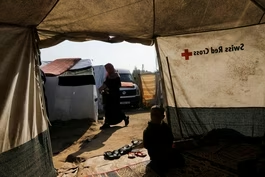
How abortion restrictions affect patient care in Wisconsin
Clip: 12/2/2023 | 7m 24sVideo has Closed Captions
How abortion restrictions affect the care Wisconsin doctors can give patients
While the number of legal abortions has risen nationwide since the Supreme Court overturned Roe v. Wade, a recent report from a group that supports reproductive rights says there have been sharp declines in states that imposed new restrictions. PBS Wisconsin’s Marisa Wojcik spoke with doctors in the state about the effect of those restrictions on their work and their patients.
Problems playing video? | Closed Captioning Feedback
Problems playing video? | Closed Captioning Feedback
Major corporate funding for the PBS News Hour is provided by BDO, BNSF, Consumer Cellular, American Cruise Lines, and Raymond James. Funding for the PBS NewsHour Weekend is provided by...

How abortion restrictions affect patient care in Wisconsin
Clip: 12/2/2023 | 7m 24sVideo has Closed Captions
While the number of legal abortions has risen nationwide since the Supreme Court overturned Roe v. Wade, a recent report from a group that supports reproductive rights says there have been sharp declines in states that imposed new restrictions. PBS Wisconsin’s Marisa Wojcik spoke with doctors in the state about the effect of those restrictions on their work and their patients.
Problems playing video? | Closed Captioning Feedback
How to Watch PBS News Hour
PBS News Hour is available to stream on pbs.org and the free PBS App, available on iPhone, Apple TV, Android TV, Android smartphones, Amazon Fire TV, Amazon Fire Tablet, Roku, Samsung Smart TV, and Vizio.
Providing Support for PBS.org
Learn Moreabout PBS online sponsorshipoverturned Roe vs. Wade, a recent report from# a group that supports Reproductive Rights says## there have been sharp declines in states that# impose new restrictions on abortion access.
One of those states Wisconsin saw# around 7,000 fewer abortions in the## year following the court's decision than the# state's annual average.
Marisa Wojcik of PBS## Wisconsin spoke with doctors there about the# effect on their work and on their patients.
JENN VOLLSTEDT, Former Labor and# Delivery Nurse: When I got the results,## I knew what I wanted to do.
MARISA WOJCIK (voice-over): Jenn Vollstedt# is a former labor and delivery nurse in## Milwaukee.
At 12 weeks pregnant, Volstead# was told something weeks pregnant, she found out she# and her unborn child were at risk.
JENN VOLLSTEDT: I knew that if I carried that# pregnancy to term I was putting my own health## at risk.
And I also knew that my baby if# she survived a term would only suffer.
MARISA WOJCIK (voice-over): Jenn Vollstedt# made her decision while abortion was still## legal.
The cascade of events following the# U.S. Supreme Court's ruling ov constitutional right to an abortion# hit states like Wisconsin the hardest## creating a near total abortion# ban in the state one year ago.
CHRISTOPHER FORD, Emergency Medicine: We have yet## to see wha MARISA WOJCIK (voice-over): Healthcare# providers like Christopher Ford,## a Milwaukee based emergency medicine# physician found themselves in le when the default legal standing reverted# back to a law from 1849.
It says destroying## the life of an unborn child is a felony,# except to save the life of the mother.
CHRISTOPHER FORD: We are in a situation where that## interpretation of a law from# 1849 is really KRISTIN LYERLY, Obstetrician-Gynecologist: We# didn't even know that germs cause disease in 1849.
MARISA WOJCIK (voice-over): Before Roe v.# Wade was overturned, Dr. Kristen Lyerly,## an OB/GYN from Green Bay, counseled patients# at one of the few Planned Parenthood clini in Wisconsin that provided abortions following the# decision she Dr. Ford and Dr. Jenn Jury McIntosh,## a maternal fetal medicine physician in Milwaukee,# joined a lawsuit challenging the 1849 law.
JENN JURY MCINTOSH, Maternal Fetal Medicine: Now# we're operating this narrow channel of providing## the best care not committing malpractice,# and being careful not to break a law.
These## pregnant people either have high risk conditions# themselves, so medical complications.
But on the## flip side, we also take care of fetuses.
So it's# the most Family Centered Outcome that we can.
MARISA WOJCIK (voice-over): Prior to the# Supreme Court's ruling, Wisconsin patients## and physicians had more options when it came to# making decisions KRISTIN LYERLY: We would have conversations# about what all their options were.
We would## talk about everything.
Sometimes we would# connect them with pren we would connect them with adoption services.# Sometimes they would go home and think about## it.
And they just wouldn't return for# that second visit.
But often they did.
MARISA WOJCIK (voice-over): Now these doctors# are managing a much different reality.
JENN JURY MCINTOSH: If it becomes clear# that they're leaning towards a termination, I have to say, unfortunately, this is# illegal in the state of Wisconsin.
And## if this is what you choose to pursue, then# we'll have to give you information on how to## pursue this out of state.
And it feels like# I'm abandoning my patients and saying that.
MARISA WOJCIK (voice-over):# Some physicians like Dr. Lyerly,## left Wisconsin so they can continue to provid KRISTIN LYERLY: I have the joy of working# in rural Minnesota and Northern Arizona on## the Navajo Reservation.
So in a way, it's very# satisfying.
But the truth is, I want to be home.
MARISA WOJCIK (voice-over): For# those who stayed they must now## navigate a law that many doctors feel is un JENN JURY MCINTOSH: It's intrinsically vague,# which then causes physicians to potentially# second guess like is this risky enough?# Because everyone who practices medicine## knows that it can be very gray for a while# and then become very black and white.
And## you the longer you wait to intervene.# The worst outcomes are in general.
CHRISTOPHER FORD: We've heard reports, you know,## in other states that have very strict a you know, we've had patients that have# been told to wait in the car until they## become even more unstable in order to# present to the emergency department So at that point in time, they can do# something about it.
Now, of course,## that's an egregious example.
And that's# something that we that is someone's interpretation of the law.
KRISTIN LYERLY: There was a time when I# sh e was bleeding, she was 21 weeks pregnant# with a desire pregnancy, but she so much that she had to go to the operating room# right away, and I had to perform an abortion.
And I couldn't help but to think to myself,# if this was happening to be in Wisconsin,## I would be terrified about what the# next steps would be about what the## implications for my future my career would be.
MARISA WOJCIK (voice-over): Physicians worry,## not only about the CH RISTOPHER FORD: What I'm seeing over and# over and over again, is this getting worse## over time.
And a lot of it has to do with the# access of health care, with the access of care## to Obstetrics and Gynecology, and a lot of the# voices that are at the table right now.
Don't see## these patients, and they don't have any medical# background, but they're making these decisions.
JENN JURY MCINTOSH: I just want to# do my job.
So the fact that politics## are trying to be present in my exam# room, present in the back of my mind,## as I'm looking at a patient and talking to that# patient and their family, that it's impacting## that at all feels crazy to me.
Because really,# we should just be providing the best evidence## based medical care that we can that's right# for that patient and right for their family.
MARISA WOJCIK (voice-over): And for Jenn# Vollstedt, she hopes in the future Wisconsinites## will be able to navigate these difficult# decisions without the barriers in p JENN VOLLSTEDT: Now, when I look back, I feel# so recovered and healed.
I also wouldn't have## my son if I didn't have this abortion because# of the timing if I had to carry it in term.
Julian, he is -- he just turned six# and he is one of the most joyful and## curious people I've ever met,# the more we try to focus on,## is that right or wrong?
Or is that okay?
The more# we're focused on making choices for other people,## when we're not involved in their health# care, and we're not medical professionals.
MARISA WOJCIK (voice-over): For PBS News Weekend,# I'm Marisa Wojcik, in Milwaukee, Wisconsin.
Israel pounds southern Gaza as hopes of reviving truce fade
Video has Closed Captions
Clip: 12/2/2023 | 3m 39s | Israeli offensive turns to southern Gaza as hopes of reviving truce dwindle (3m 39s)
What to know about the COP28 deal to cut methane emissions
Video has Closed Captions
Clip: 12/2/2023 | 7m 47s | What to know about the COP28 deal and new U.S. rules to cut methane emissions (7m 47s)
Providing Support for PBS.org
Learn Moreabout PBS online sponsorship
- News and Public Affairs

FRONTLINE is investigative journalism that questions, explains and changes our world.

- News and Public Affairs

Amanpour and Company features conversations with leaders and decision makers.












Support for PBS provided by:
Major corporate funding for the PBS News Hour is provided by BDO, BNSF, Consumer Cellular, American Cruise Lines, and Raymond James. Funding for the PBS NewsHour Weekend is provided by...

